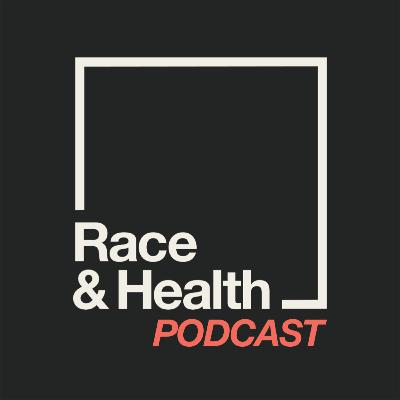Discover Race and Health Podcast
Race and Health Podcast

Race and Health Podcast
Author: Race & Health
Subscribed: 7Played: 55Subscribe
Share
© Race & Health
Description
Welcome to The Race & Health Podcast, an exploration of the nexus between health and racial justice. Listeners can expect thought-provoking conversations that challenge conventional perspectives and inspire new ways of prompting action towards public health justice. Each episode features expert guests from public health, sociology, and racial justice advocacy. Tune in to The Race & Health Podcast and become a catalyst for transformation in the fight against health inequities.
Produced by Mita Huq and Delan Devakumar.
Produced by Mita Huq and Delan Devakumar.
32 Episodes
Reverse
In our final episode of Series 3, Intersectionality brings three researchers together to discuss how intersectionality can serve the health community and promote health equity. The episode explores where intersectionality comes from, why it was created, and how it can be used to address health inequities across the health community.
Guests include Dr Brenda Hayanga, Presidential Fellow at the School of Health and Psychological Science, University of London; Dr Geordan Shannon, medical doctor and ex-academic, and founder of Stema, Unexia, Planet.Health, and Global Health Disrupted; and Dr Zara Trafford, Institute for Life Course Health Research, Department of Global Health, Stellenbosch University, Cape Town, South Africa.
The official episode transcript will be available shortly.
Humans have attempted to make meaning out of our physical differences for centuries. As this thinking evolved, the associations between disease and race grew closer—but not without political intent. This association has polluted our understanding about the relationship between race and health, leading to the continual use of outdated and harmful medical practices and perspectives in clinics around the world. In other words, the history of medical racism is one of colonialism and eugenics. Join us in this episode as we explore what this means, and how this historical evolution impacts today’s medical practice and politics.
Guests include Erica Charters, Professor of the Global History of Medicine at the University of Oxford, Carlos López Beltrán, Senior Researcher at Instituto de Investigaciones Filosóficas, National Autonomous University of Mexico, and Alexandre White, Assistant Professor in the Johns Hopkins Department of Sociology and in the Department of the History of Medicine.
Access this episode's official transcript here.
Whose knowledge is represented in our health research, policies, and practice? Who is heard, listened to and believed in our health system, and why? There are differences in not only whose perspectives are represented in society, but also what knowledge is valuable. On this episode of the Race & Health Podcast, we explore the concept of epistemic injustice: the idea that knowledge and systems of knowledge production favour the perspectives of those at the top of the social hierarchy. We will explore how epistemic injustice works, what this means for representation in research, services, and policies, and ultimately, how this relates to racism and health.
This episode's guests include Dr Seye Abimbola, Associate Professor and Principle Research Fellow at the University of Sydney, Dr Rageshri Dhairyawan, Consultant in Sexual Health and HIV Medicine at Barts Health NHS Trust and an Honorary Senior Lecturer at Queen Mary University of London, and Dr Thirusha Naidu, Head of Clinical Psychology at King Dinuzulu Hospital and an Associate Professor in the School of Nursing and Public Health at University of KwaZulu-Natal.
In this episode, we shed light on how the social construction of race and its operators take a physiological toll of chronic exposure to racism. We'll discuss maternal and child health, the concept of race and biology, and how constant microaggressions, systemic inequalities, and overt discrimination can lead to a sustained state of stress that goes far beyond mere emotional distress. We will also explore recommendations for our listeners about where our efforts to apply anti-racism in our lives matters, and how we can strive for a future where everyone, regardless of their background, can live a healthy and fulfilling life.
Guests include Dr Ndidiamaka Amutah-Onukagha, the Julia A. Okoro Professor of Black Maternal Health in the Department of Public Health and Community Medicine at Tufts University School of Medicine, Dr Arline Geronimus, Professor of Health Behaviour and Health Education at the University of Michigan, and Dr Jonathan Wells, Professor of Anthropology and Paediatric Nutrition at the Population, Policy & Practice Department at UCL.
Eugenics is a concept closely tied to what makes us unwell, and its roots in race medicine amplifies the drivers of racial health inequities, ableism, and white supremacy. Though scientifically flawed, eugenic thinking is present throughout modern-day society and politics. We can see eugenic thinking in policies and protocols throughout the pandemic, through mental health, and much more. Learn about how eugenics was created, how it has been employed, and how today’s public health world is still riddled with this divisive concept.
Guests include Dr Ayah Nuriddin, who's the Cotson postdoctoral fellow in the Society Fellows, and a lecturer, and in the Council of the Humanities in African American Studies at Princeton University, Miss Angela Saini an award-winning journalist and author of books, including Superior, the Return of Race Science, and Professor Marius Turda, professor of biomedicine and director of the Centre for Medical Humanities at Oxford Brookes University.
Transcript available here. You can also listen to this podcast on The Lancet Voice.
Populism has a big role in our health, informing and structuring policies that sharpen health inequities along racial and ethnic lines. This episode discusses how structural racism interacts with populist ideology and politics to create health inequities. How does historically divisive discourse and the political systems and institutions that grow from them reinforce inequities? Learn more about these issues with our guests Gustavo Andrey de Almeida Lopes Fernandes, Professor of Public Policy at the A Escola de Administração de Empresas de São Paulo da Fundação Getulio Vargas, Brazil, Alexandra Haas, the executive director of Oxfam Mexico, and Martin McKee, a Professor of European Public Health and Medical Director at the London School of Hygiene and Tropical Medicine. This episode will discuss how populist narratives demonise migrants, US migration policy, social media, and more.
Transcript availble here.
In this first episode of Series 3, we return to the disproportionate impact that COVID-19 has had on minoritised communities, and across the global South. Ayoade Alakija, Chair of the African Vaccine Delivery Alliance, Kevin Fenton, Public Health Director for London, UK, and Kumanan Rasanathan, Executive Director at the Alliance for Health Policy and Systems Research will explore this issue by unpacking key themes of power and influence. Drawing from their experiences in public health practice and global health policy, they discuss how racism stratifies power across the community and structural levels, and why communities of colour bear the brunt of the pandemic. How do policies informing preparedness and resource distribution reinforce these differences? Subscribe to learn more and stay tuned.
Check out more work by our collaborating producers on The Lancet Voice and learn more about the stories behind global health, policy, and clinical research.
Episode Transcript is available here.
Welcome back to the Race & Health Podcast. We're thrilled to kick off Series 3, where we continue our mission to explore the racism's impact on health. This Series, we're teaming up with The Lancet Voice to take closer look at themes from our work on the Lancet Series on racism, xenophobia, discrimination, and health.
We will host a diverse array of experts, activists, and storytellers. We will take a deep dive into issues ranging from COVID-19, to history, to populism. Whether you're a returning listener or new to the Race & Health Podcast, Series 3 offers expert perspectives, technical background, and field accounts to provide listeners a better understanding of racism and its impact on health.
In this Series 2 finale, Envisioning Environmental Equity, we revisit interviews conducted at COP27. Part 2 of our COP27 Reflections is both a look back into the conference, and a review of the recent Bonn Climate Conference, and a look forward to COP28. Delan is joined by Sonora English, a Research Assistant at UCL and together, they process the perspectives of people from around the world as they hare their perspectives on the profound impact of
climate change on public health and justice. Contributors include Maria Neria, Director of the Public Health, Environment and Social Determinants of Health Department of the World Health Organization (WHO), Brazilian climate justice activists, Adriani Maffioletti, and more.
Last November, members of Race & Health attended COP27 to discuss the intersection between racism, colonialism, climate change, and health. In this special two-part episode, we discuss our reflections on this experience. In Part 1, speakers from our previous episode on young climate activists rejoin us for our milestone event to discuss their perspectives on COPs.
Jon Bonifacio is an activist, musician, National Coordinator at Kalikasan People's Network for the Environment, and former National Coordinator of YACAP.
Heizal Nagginda is a climate and environmental activist from Uganda. She is the founder of Climate Operation a youth-led organisation that educates Ugandan children about climate change as well as involve them in climate related activism in form of tree planting activities.
Priscila Sato, is a Lecturer at the School of Nutrition of the Federal University of Bahia, Race & Health collective member.
Learn more about the Envisioning Environmental Equity project here. Watch our films here.
Transcription available here.
Trauma, grief, and mental health: climate change is disrupting our relationship with the environment as we know it, causing a sense of loss, sudden detachment, and depression - a set of experiences some refer to as solastalgia. In this episode of Race & Health, we discuss mental health and solastalgia with Land Body Ecologies (LBE), a research group that explores this concept with the Ogiek (Kenya), tribal communities in the buffer zone around the Bannerghatta National Park (India), northern Finnish border region communities including the Sámi, and the Batwa (Uganda). We hone into the colonial habits of intended solutions to climate change, such as conservation projects, and how resulting forced displacement has produced more harm for traditional and land dependent communities.
Babitha George is an LBE partner at Quicksand, and is one of the co-founders of the UnBox Festival, leading on networks and collaborations bringing together efforts around social change, art and culture, thoughtful design and open research. IG: @BabeGeorge , @QuickSandStudio | Twitter: @UnwindingBlues , @HelloQS
Daniel Kobei is the founder and Executive Director of Ogiek Peoples’ Development Program (OPDP), an NGO in Kenya that promotes the human and land rights of the indigenous Ogiek and a core team member of the Land Body Ecologies project. Twitter: @kobskobei , @OgiekPeoples | IG: @ogiekpeoplesdevprogram
Samrawit Gougsa is Head of Communications at Minority Rights Group International, an NGO working to safeguard the rights of ethnic, religious and linguistic minorities and indigenous peoples worldwide. She is interested in the social determinants of health among marginalised communities, and the intersection between land rights and mental health. Website: https://minorityrights.org/ | IG: @MinorityRightsGroup | Twitter: @SamGougsa , @MinorityRights
Land Body Ecologies: IG: @LandBodyEcologies | Twitter: @LBecologies
Colonialism persists in many ways, including how waste is managed. In this episode, we discuss the relationship between waste colonialism, the climate crisis, and how these processes produce negative health outcomes for vulnerable communities predominantly in the global South. Join Alice Mah from the University of Warwick, Angelo Luow from Greenpeace, and Sonora English from Race & Health as they discuss how waste colonialism increases the production of plastic, the role of corporate power and the fossil fuel industry, and the social structures that perpetuate exposure to waste.
Alice Mah is Professor of Sociology at the University of Warwick, with research interests in environmental justice, corporate power, and toxic pollution. Her latest book is called Plastic Unlimited: How Corporations are Fuelling the Ecological Crisis and What We Can Do About It.
Angelo Louw is an award-winning documentarian and climate justice activist. He is the Pan-African Plastic Project Lead at Greenpeace.
Sonora English is a member of the Race & Health collective and a research assistant at UCL where she works on the Envisioning Environmental Equity initiative, a climate and racial justice collaboration.
The relationship between climate change and migration is complex. In this episode of the R&H Podcast, we discuss these complexities from an anti-discrimination perspective. How does racism, xenophobia, and discrimination define health inequalities in migrant communities, when does migrant status matter, and what can the health community do about this? Explore these questions with our guests, Báltica Cabieses, Maya Goodfellow, and R&H rep, Rita Issa, who brings expertise about migrant access to healthcare, conceptualising the “climate migrant”, and the health inequalities migrants face amidst the climate crisis.
Báltica Cabieses is a nurse midwife and professor at Universidad del Desarrollo in Chile and former Co leader of Launced migration for Latin America.
Maya Goodfellow is a Leverhume Early Career Researcher at the University of Sheffield. She is also author of the book, Hostile Environment: How Immigrants Became Scapegoats.
Rita Issa is a UK-based physician doing research on climate change, migration, and health.
For more information about R&H's work, including our newsletter centred on migration, visit www.raceandhealth.org, and follow us on social media @RaceAndHealth
This episode explores how unequal health outcomes for minoritised communities are influenced by air pollution.Touching on causes and sources of air pollution, city design, measurement and research, Dr Anne Dorotheé Slovic from the University of São Paulo, Ms Lilian Latinwo-Olajide from Impact on Urban Health, and Dr Chetna Sharma from Race & Health discuss how structural racism is a driving force behind these unequal outcomes, and what climate justice means for our climate action in this space.
Anne is an Adjunct Professor at the University of São Paulo School of Public Health who specialises in comparative urban studies, with an emphasis on global environmental health, sustainable public policy, and reducing inequalities.
Lilian is a Portfolio Manager at Impact on Urban Health. She co-leads the Amplifying voices programme strand on the health effects of Air Pollution.
Chetna is a medical doctor, training to be a public health specialist in London. She works with the Research and Public Engagement teams at Race & Health, and her areas of interest lie in climate and health justice, and intergenerational mental health.
In this episode, we explore the role of young people in the move against climate change, and the work they're doing to promote climate justice. Joined by Heizal Nagginda, founder of Climate Operation in Uganda, Priscila Sato, a researcher from the University of São Paolo, and Jon Bonifacio from Youth Advocates for Climate Action Philippines (YACAP), host Delan Devakumar grapples with the role that climate education, justice, and advocacy by young people can have on equitably addressing climate change.
In this first episode of the Envisioning Environmental Equity series, our host Delan Devakumar is joined by Race & Health representative Abi Deivanayagam, and external guests Mulindwa Moses, co-founder of CYE Believe, and Norly Mercado, Asia Regional Director at 350.org to discuss the meaning of “environmental justice”. Join us as we discuss the role of colonialism in shaping the unequal health impacts of the climate crisis, the value of MAPA-centred solutions, and the importance of considering power in climate action.
Find out more about our guests:
Mulindwa Moses, CYE Believe | Instagram: @mulindwa_guy
CYE Believe: https://cyebelievenetwork.org/
Norly Mercado, Asia Regional Director at 350.org | Instagram: @350org | Website: https://350.org/about/
In this episode, we explore how casteism works as an underlying system of power, and its impact on environmental justice and health in India. Contextualised by sanitation work and environmental health, this episode details how casteism shapes disproportionate health outcomes experienced by Dalit communities, and the political nature around sanitation work.
Join Delan as he and R&H representative Mita Huq engage these topics with Dr Malini Ranganathan, an Associate Professor at American University who studies urban environmental racism and casteism, and Mr Kanthi Swaroop, a PhD candidate at the Indian Institute of Technology in Bombay working on issues in manual scavenging through urban sociology.
Funding plays a central role in determining how and what health outcomes are addressed in public health, health research, and development. Where the money goes and how funding applications are processed remain disparate between end users.
Join Delan Devakumar in exploring the structural causes that underlie funding disparities and inequities as he and R&H representative, Joohee Uhm, discuss the funding world with Ms Lauren Pires who has extensive experience with grant work at the non-profit and foundation levels, and Dr Diego Baptista, whose career has moved research culture towards equity and diversity.
Transcripts for this episode will be provided soon for greater accessibility.
R&H Pod host Delan Devakumar sits with Touchpoint Team Lead Kadi Toure to discuss racism and its impact on health. Thank you for hosting us, PMNCH Touchpoint!Watch the video version of this episode on PMNCH Touchpoint's YouTube Channel.Touchpoint is a podcast by PMNCH that explores key issues related to women’s, children’s, and adolescent health. From Touchpoint:💡 What’s one action you can take today to fight racial discrimination in healthcare? Drop your thoughts in the comments! 📌 RESOURCES & LINKS 👉 Learn more at www.raceandhealth.org 👉 Follow the latest updates from PMNCH: www.pmnch.who.int 📢 Follow us on social media for more updates! 🌍 Twitter/X: https://x.com/PMNCH 📸 Instagram: / pmnch_insta 🔗 LinkedIn: / pmnch
This episode is a part of a mini series, featuring episodes from Global Health Lives.
Prof Naomi Priest is a lifecourse and social epidemiologist at the Australian National University. Naomi’s research focuses on understanding how social forces become embedded and embodied to influence health and health inequalities throughout life. In this episode, Naomi talks about how racism impacts child and adolescent health and school-based interventions to reduce racism. Naomi is also a Commissioner on the Lancet Commission on racism and child health.
Learn more about the Commission’s work at www.raceandhealth.org/commission
Listen to GHL at https://podcasters.spotify.com/pod/show/globalhealthlives















